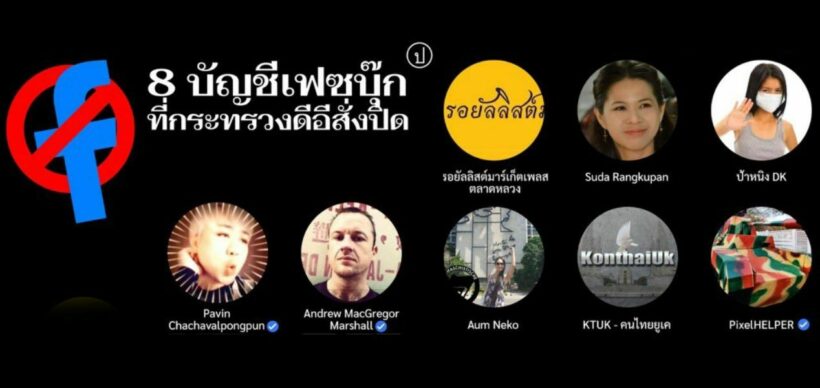Courts order ISPs block 8 users from web, social media

Digital Economy and Society Minister Chaiwut Thanakhamanusorn confirmed today court orders instructing internet service providers to block or remove 8 users the government says used social media or their own websites to post fake news. The ISPs met with the ministry to receive the court order to block the users.
The court ordered the ISPs to either remove or block access to information shared by the 8 accounts on any websites or social networks the alleged fake news is published on. The order also instructs ISPs to block and remove their IP addresses and passwords.
The minister provided instructions to the ISPs on what steps they must take to remove and block the accounts. They were also informed of penalties for failure to comply with the order. He warned other internet uses to exercise caution in what they post on the internet and me mindful of Thailand’s online laws.
The 8 people included in the list to be banned are:
1. Pavin Chachavalpongpan – an outspoken professor at Kyoto University, living in exile in Japan. He’s been critical of the government and monarchy and when he was ordered to turn himself in after the 2014 coup, offered to send his pet chihuahua instead. He created The Royalist Marketplace, a Facebook page that was blocked after amassing over 1 million members.
2. Royalist Marketplace – Talad Luang – the replacement Facebook page Pavin created to freely discuss the Thai government and monarchy is also on the list.
3. Andrew MacGregor Marshal – A Scottish journalist who was the first journalist in the world to break the story of King Bhumibol’s death hours before the official announcement. He resigned from Reuters when they didn’t publish a controversial story about the monarchy’s political involvement and his 2014 book A Kingdom in Crisis is banned in Thailand.
He took to Twitter within the past hour to that the court’s demands are impossible for ISPs to enforce, from a technological standpoint, saying ISPs can’t selectively block individual Facebook pages. He called the ruling a publicity stunt.
“Unless they have some other plan, my Facebook will continue to be accessible in Thailand, and it’s an embarrassment that the country’s digital economy minister doesn’t even know how the internet works.”
4. Suda Rangkupan – a former lecturer in Linguistics at Chulalongkorn University, in exile since the 2014 coup, who calls herself pro-democracy and Republicanism, and calls for the monarchy to be abolished.
5. DK Ning – a popular Facebook and YouTube account.
6. Aum Neko – a transgender student activist that used sexually provocative photos to call for equality, protest school uniforms and fight for pro-democracy and anti-monarchy causes, now exiled in France after deciding to flee arrest knowing she would be held in a male prison.
7. Kon Thai UK – A Facebook page highly critical of PM Prayut Chan-o-Cha, that saw 10 people prosecuted for computer crimes after sharing posts from its page.
8. Pixel HELPER – A German-based non-profit that states they fight for human rights through art and satire, claiming “we don’t want to be taken seriously, but our opponents have to take us seriously,” which seems to be the case in today’s ruling for ISPs to block these 8 users.
SOURCE: Bangkok Post
Latest Thailand News
Follow The Thaiger on Google News:


























